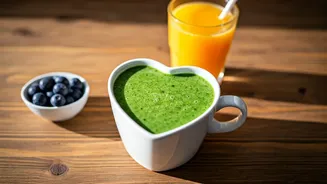Start with Water
Begin your day by drinking a glass of water, which is a fundamental aspect of cardiovascular health. Water supports optimal blood volume, ensuring your heart
doesn't have to work extra hard. Staying well-hydrated makes it easier for the heart to pump blood effectively, reducing the strain on the organ. Dehydration can cause an increase in heart rate and reduce blood volume, potentially making the heart work harder. Drinking water first thing in the morning aids in the body's natural processes, including digestion and nutrient absorption, which indirectly supports heart health. The benefits extend beyond immediate hydration; proper hydration also helps maintain healthy blood pressure levels, further supporting cardiovascular wellness. Consider adding a squeeze of lemon or lime to your water for a refreshing and flavor-enhancing experience.
Oatmeal's Power
Start your day with a serving of oatmeal to improve heart health. Oatmeal is packed with soluble fiber, a key component for managing cholesterol levels. The fiber in oatmeal helps reduce the absorption of cholesterol from food, lowering overall LDL (bad) cholesterol levels. Lowering LDL cholesterol is directly linked to a reduced risk of plaque buildup in arteries. This reduces the risk of cardiovascular diseases. For enhanced benefits, consider incorporating fruits such as berries, which provide additional antioxidants, or nuts and seeds, which contribute healthy fats. Preparing oatmeal is simple: mix rolled oats with water or milk and cook on the stove or microwave, adding your favorite toppings. Regular consumption of oatmeal is a simple yet effective way to support your heart health.
Green Tea's Impact
Including green tea in your morning routine offers a powerful boost to heart health, thanks to its rich concentration of antioxidants, especially catechins. These antioxidants fight against free radicals, protecting your arteries from damage and reducing the chances of plaque buildup. By enhancing blood vessel function and improving blood flow, green tea helps maintain healthy blood pressure levels and reduces the overall risk of heart disease. Furthermore, green tea may improve blood cholesterol profiles, which is beneficial for overall heart health. To prepare green tea, steep tea leaves in hot water for a few minutes. You can drink it plain or add a touch of honey or lemon for added taste. Consistent consumption of green tea can make a significant difference in your heart's well-being.
Citrus Juices Benefit
Start your day with a glass of fresh citrus juice to boost your heart health. Citrus fruits like oranges, grapefruits, and lemons are packed with vitamin C and other antioxidants that protect the arteries from damage and minimize the risk of plaque formation. Vitamin C helps to strengthen blood vessels and improves their elasticity, which promotes better blood flow. Regularly drinking citrus juices contributes to lowering blood pressure and enhancing overall heart function. It is important to note that you can prepare fresh juices at home using a juicer or blender, or opt for store-bought, ensuring you choose varieties without added sugars. Consume them in moderation as part of a balanced diet and overall healthy lifestyle to get the most benefits.
Tomato Juice's Role
Incorporate tomato juice into your morning routine to give your heart health a boost. Tomato juice is rich in lycopene, an antioxidant that offers significant benefits in promoting heart wellness. Lycopene helps reduce the risk of heart disease by fighting oxidative stress and lowering inflammation within the body. It also contributes to lowering LDL cholesterol levels and improving arterial health. Tomato juice is packed with essential nutrients, including vitamins and minerals that are important for overall health, further supporting cardiovascular function. Choose fresh or low-sodium tomato juice for the best benefits, or make your own at home using fresh tomatoes and a blender or juicer. Include tomato juice as part of a balanced diet to promote a healthy heart.



















